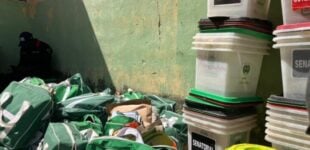This ethnic violence is a product of NOT engaging the youth

BY JOHN OLUWADERO
Two Thursdays ago, a misunderstanding between two traders of Yoruba and Hausa ethnicities in Shasha community in Ibadan led to the death of two people. By the following Friday, reprisal attacks led to the death of an additional eight people, and by Saturday, there was full-blown ethnic violence which led to the destruction of lives and property — and 11 people reportedly dead, over 3000 people displaced, hundreds of shops and residence destroyed, goods and properties worth billions of naira all gone.
To put into perspective, the number of combined years it would cost all the victims of the clash to build the properties and business lost, would be a minimum of 600 years. The combined age of the people that died from the clash would be a minimum of 400 years. In just less than three days, a minimum of 1000 combined years of efforts was brought down and totally destroyed, and the truth we had better accept early enough that this crisis is not a product of ethnicity, but rather a product of continuing lack of intentional civic engagement of young people.
Last month, in the heat of the herdsmen-farmers crisis in Ibarapa LGA, an elderly friend shared with me his concern that there may be a crisis in Shasha soonest, and his forecast was based on just one theory — the increasing tension of youth unrest in Ibadan. Over the last five months, there has been an increase in youth unrest in the city of Ibadan. Most of these incidents have nothing to do with ethnicity, and this crisis has been in existence before the eviction notice given by Sunday Igboho to Fulani herdsmen in Igangan.
In the heat of the EndSARS protest in October 2020, Ibadan was one of the cities where hoodlums took over the streets and extorted motorists by forming roadblocks — I witnessed this myself. There were reports of other heated crises like the killing of police officers and the burning of a police station in Ojo, a neighbouring community to Shasha where last week’s ethnic violence took place.
As a youth worker, I have been following closely how the weak response of the government to manage youth unrest since October 2020 has led to an increasing rate of community violence in Ibadan. It’s been insinuated that the killings of police officers during the EndSARS protest in Ibadan has weakened the relationship between the police force and the Oyo State government, hence their lack of swift response to the prevailing violence in the state.
At the peak of the Fulani herdsmen crisis in Ibadan, an army of restless youths had been prepared by the tensed atmosphere, more so by the constant beating of civil war drums on social media. With the existing state of affairs, the government must urgently realise that Ibadan is in a tense state where any form of violence could take place. And, what would inform the next form of violence would have a lot to do with the demographics of the community in focus.
Ethnic violence took place in Shasha because it is a community with both Hausa and Yoruba traders. You can’t see such taking place in Awolowo or Samonda. Ethnicity is the demographics that fueled the Shasha violence. Religion and political affiliation are key demographics that the Oyo state government needs to proactively consider in preventing future violence. However, key subsets of these demographics that often perpetrate violence in the name of the entire demographics are the unemployed, uneducated, and “unengaged” young people, with no form of civic orientation.
From videos shared on social media on the Shasha crisis, it can vividly be observed that the main perpetrators of the violence were youths below age 35. Ibadan is home to millions of “unengaged” young people with no civic orientation, and livelihood means. We must ask ourselves if we have made adequate investments in empowering young people as active citizens that can contribute positively to society.
The truth remains that the government has failed in this regard. If a random survey of the perpetrators of the Shasha violence is to be taken, most likely 65% of the perpetrators may not have completed secondary school education, and 95% of them may not have any form of post-secondary education, let alone participating in the National Youth Service Corps NYSC, which we have hyped as an institutionalized approach to fostering national unity and civic orientation across ethnic and religious lines.
Yet, a larger percentage of Nigerian youths are unable to access post-secondary school education, hence are unable to participate in the National Youth Service, leaving our streets flooded with an army of youths lacking civic orientation and cross-cultural competence for peaceful co-existence.
For us to curb the prevailing violence, and stop the drum of war beating over Nigeria, we must realise that the tension in the country right now is a product of not engaging young people. The solution to easing the growing tension is a two-edged sword — on one hand, enforcing justice and security at the community level, and on the other hand, engaging young people at the grassroots level, not through a national youth program that would have no local reach and relevance. This recommendation would involve legislative strengthening of the local governments, and the institutionalisation of youth work practice.
Oluwadero is the president of Building Nations Initiative (BNI), and a senior youth worker at the BNI Youth Centre, University of Ibadan. He tweets @JOluwadero.
















Aptly Explained!
The institutionalisation of youth work practice would go a long way in curbing violence in our country